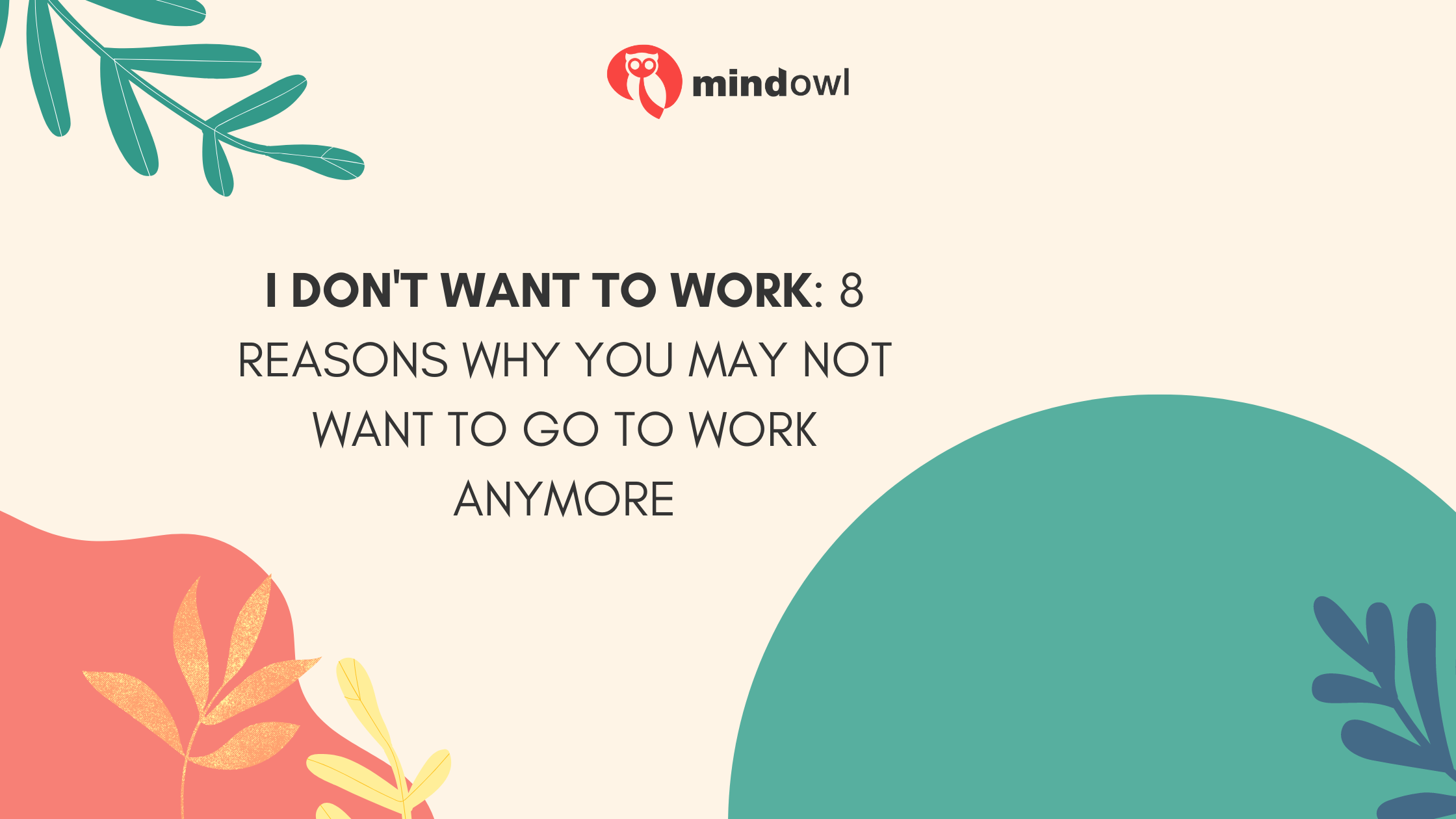Waking up every morning with a heavy heart, dreading the day ahead at work, is no way to live. You’re not alone if you find yourself thinking, “I really don’t want to go to work.” This feeling might seem confusing or worrying.
But many people feel this way for various reasons. It’s normal. A key fact to remember is that a drop in job satisfaction can make you dislike going to work. This happens when your role doesn’t make you happy.
This blog will delve into eight common reasons why you might have lost your motivation for work—from burnout and boredom to feeling unappreciated or trapped in a hostile environment.
Key Takeaways
- Feeling burnt out, bored, or in the wrong career can lead to not wanting to go to work.
- A hostile work environment and feeling underappreciated add stress and unhappiness at your job.
- Health issues, both diagnosed and undiagnosed, impact motivation and the ability to work full-time.
- Communicating with your boss, protecting mental health, and positive habits help improve your work attitude.
- Exploring new careers or self-employment offers a chance for more satisfying work.

Understanding the Desire Not to Work
Feeling like you don’t want to work might make you uneasy or guilty, but it’s more common than you think. Many people reach a point where they dread going to their jobs each day. This feeling can come from burnout due to long hours and high stress.
These factors eat away at your drive, leaving you exhausted and unmotivated.
Discovering why you feel this way is key. It could be because of boredom, being in the wrong career, or dealing with a harsh workplace atmosphere. Sometimes, physical or mental health issues are the root cause that hasn’t been addressed yet.
Knowing these reasons helps pinpoint what’s sapping your desire to work and get back on track toward enjoying your job again—or finding a new one that suits you better.
Common Reasons for Not Wanting to Work
Feeling burnt out from work can lead to a lack of motivation and enthusiasm for your job. Boredom at work might make you feel unfulfilled and disengaged in your daily tasks.
Burnout
Burnout happens when you work excessively for too long under high stress, leaving you feeling exhausted, uncaring about your job, and negative. This problem comes from working hard without feeling like you have any say in what you do or how you do it. Too many tasks and feeling out of control are big reasons people burn out.
Boredom
Feeling bored at work, known as “boreout,” can be more harmful than being overworked. It occurs when your job lacks challenge or growth opportunities, making every day feel repetitive and leaving you disengaged. Over time, this lack of fulfillment may push talented employees to seek new career paths.
Unsuitable career
Choosing a career that doesn’t fit your interests or skills can lead to boredom, excessive difficulty, or a lack of passion if you pursued it due to external pressures. This can make workdays feel long and draining. While changing careers is daunting, staying in an unsuitable role leads to unhappiness.
Hostile work environment
A toxic workplace filled with negativity, politics, stress, bullying, and harassment can make going to the office extremely difficult and demoralizing. Such an environment breeds conflicts, illness, high turnover, and potential legal issues if employers allow mistreatment to persist.
If you’re facing discrimination, harassment, or wrongful termination, consulting an employment lawyer in Roseville can help you understand your rights and legal options. Seeking professional guidance can provide clarity and potentially lead to a resolution that improves your work situation or allows you to move forward with legal action.
Undiagnosed medical problems
Many people might not realize they’re suffering from health issues. These problems can be physical, like a hernia, or involve mental health conditions. Sometimes, these conditions stop folks from working full-time. For men especially, hernias are a common reason for missing work days. But it’s not just about the obvious physical illnesses; some workers have mental health conditions or diseases that doctors haven’t named yet.
If your doctor finds a serious condition that stops you from holding down a full-time job, you might qualify for Social Security disability support.
Feeling underappreciated or alienated
Lack of appreciation and value for employees can lead to increased stress, burnout, and a negative perception of one’s job, sapping motivation. A toxic culture that fosters alienation and exclusion exacerbates unhappiness and the desire to quit or dread going to work.
Lost sight of your goals
Excessive discomfort or burnout at work can cause individuals to lose sight of their long-term career aspirations, making it harder to stay motivated. Recognizing the reasons behind this lack of motivation can help refocus and realign with goals.
Negative company culture and infrastructure
A toxic work culture characterized by poor morale, lack of enthusiasm, and high turnover can demotivate employees and decrease productivity. Poor communication from leaders, cliques, and favouritism contribute to a negative environment, prompting employees to seek opportunities elsewhere. Organizations must actively work to create an inclusive and positive culture.
Strategies to Address Feelings of Not Wanting to Work
Protecting your mental health and wellbeing
Create a safe space at work by taking breaks, managing stress through activities like deep breathing or stretching, and setting boundaries with your workload to avoid burnout. Identify workplace stressors and take steps to address them, such as exercising outside of work hours or seeking professional help. Develop healthy coping mechanisms like meditation or talking openly with trusted colleagues.
Talking to your supervisor
If feeling overwhelmed or demotivated, communicate openly with your supervisor about your concerns. Your supervisor can provide support, and guidance, and help find solutions that benefit both you and the company. Open communication is crucial for addressing motivation issues and fostering a healthier work experience.
Identifying your feelings and considering actionable changes
Acknowledging your emotions is the first step towards making meaningful changes. Once you identify how you feel, take actionable steps like discussing concerns with colleagues or supervisors, suggesting alternative approaches, or considering if a change is needed to positively impact your work situation.
Taking a mental health day
When feeling overwhelmed, taking a mental health day is essential for regaining balance through self-care and addressing work-related stress. This time off, whether paid or unpaid, allows you to invest in your overall well-being by taking care of yourself and anything affecting your mood.
Building positive habits
Incorporating small positive habits like setting goals, taking breaks, practicing gratitude, prioritizing tasks, and making to-do lists can improve your outlook on work. These habits enhance motivation, productivity, reduce stress, and promote a healthier work-life balance while fostering an optimistic mindset.
Fighting for Your Rights
If you believe your rights as an employee are being violated, take action by thoroughly documenting any incidents, reviewing your employer’s grievance policies, and following proper channels to report complaints in writing. If your employer fails to address the issues, contact relevant government agencies like the Equal Employment Opportunity Commission (EEOC) for discrimination cases, or consult an employment lawyer to understand your legal rights and options for formal action.
Don’t be afraid to speak up and advocate for yourself, as retaliation against employees who raise legitimate complaints is illegal, but remain professional throughout the process. While confronting an employer can be difficult, protecting your rights is crucial for creating positive change in the workplace.

Exploring Alternatives to Traditional 9-5 Job
Searching for a New Job
With the evolving job landscape, exploring new opportunities can provide a refreshing change and open doors to fulfilling career paths. Alternatives such as remote work, freelancing, and flexible hours offer diverse options that cater to various preferences and lifestyles, allowing individuals to find roles that align with their goals, skills, and aspirations.
Looking for an Alternative Career
If you’re seeking an alternative career, consider job options with non-traditional hours or remote work. The gig economy offers opportunities for freelance work and flexibility in roles such as part-time and contracted positions. Hybrid work arrangements can also provide a balance between office and remote settings, offering more choice and autonomy in your career path.
Considering Self-Employment
Self-employment offers flexibility and independence that traditional jobs can’t match. While job security may draw people to regular employment, declining perceptions are making self-employment more appealing. Alternatives include freelancing, owning a business, and other options that allow individuals to find great ideas, use their skills and passions, and implement their ideas.
Monetizing Your Hobbies
Monetizing your hobbies can provide unexpected financial support by turning pleasurable activities into a source of income, especially if you have skills or interests that others value. However, it’s important to note that monetizing hobbies might lead to a loss in enjoyment and make them feel like a business rather than a leisure activity. Certain hobbies may also present challenges when attempting to earn money from them.
Conclusion
Feeling burnt out, underappreciated, or simply uninterested in working is a common experience. It’s crucial to consider our mental well-being and address the root causes of these feelings rather than pushing through them.
By recognising the reasons behind not wanting to work and taking actionable steps to change our situation, we can improve our outlook on work. Exploring alternative career paths or seeking supportive work environments are viable options worth considering for a more fulfilling professional life.
Taking proactive measures to prioritise mental health and well-being is essential for achieving job satisfaction and overall happiness.
FAQs
1. Why might I not want to work anymore?
You may not want to work anymore because you’re feeling unmotivated, hate your current job, or the 9 to 5 routine no longer excites you. It’s normal to feel this way at times.
2. Is it okay to take a mental health day from work?
Taking a mental health day is important. It gives you time for personal reflection and can help improve your outlook on work and life.
3. What should I do if I don’t want to go back to my job after working from home?
Talk to your boss about how you’re feeling — maybe there’s a way to blend remote and office work that suits you better. If not, it might be time for a new job search.
4. Can wanting not to go back signify something more serious?
Yes, consistently dreading going back could be a sign that changes are needed in your life — whether it’s seeking something different in your career or addressing other personal issues.
5. How can I find motivation at work again?
Try setting small goals or finding something new at work that interests you; sometimes even planning breaks throughout the day helps! Also consider talking with fellow employees who may share similar feelings.
6. What if nothing changes after trying these tips?
If nothing improves, it might be time for bigger steps like going back to school or entering training programs — anything that aligns more with what makes you happy and fulfilled in life.
MindOwl Founder – My own struggles in life have led me to this path of understanding the human condition. I graduated with a bachelor’s degree in philosophy before completing a master’s degree in psychology at Regent’s University London. I then completed a postgraduate diploma in philosophical counselling before being trained in ACT (Acceptance and commitment therapy).
I’ve spent the last eight years studying the encounter of meditative practices with modern psychology.

